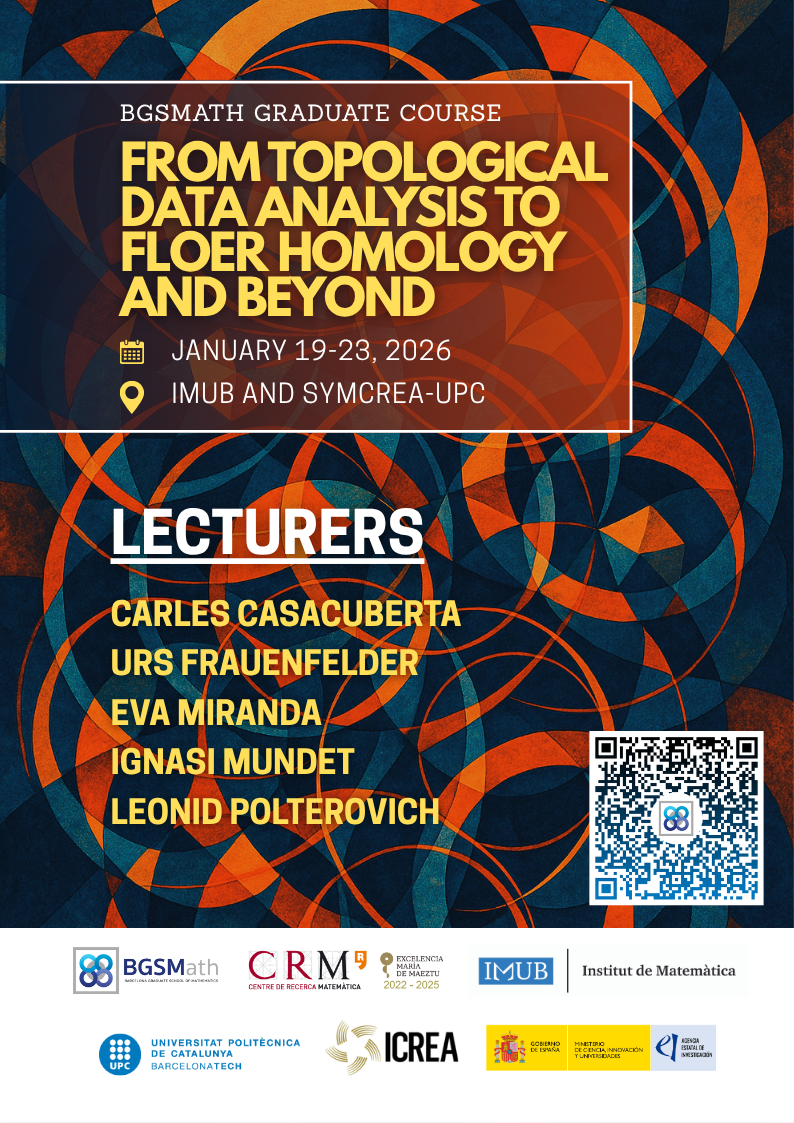From topological data analysis to Floer homology and beyond
Sign into January 23, 2026
Venues:
Aula T1, IMUB, Universitat de Barcelona
Sala de Graus, EPSEB – SYMCREA, Universitat Politècnica de Catalunya
SYMCREA website
This course is cofunded by the Institut de Matemàtica de la Universitat de Barcelona (IMUB)

Introduction
The goal of this course is to explore two contemporary topics at the intersection of Geometry and Topology. One of these is Topological Data Analysis (TDA), a field that applies topological methods to the study of structured datasets. TDA provides a toolkit for revealing hidden patterns, capturing geometric features, and uncovering shape-related properties of data, making it a valuable methodology across diverse scientific and analytical disciplines.
The other focus of the course is Floer Homology, a powerful algebraic framework for detecting fixed points and periodic orbits in dynamical systems. The course also introduces the theory of persistence modules, an emerging area that combines topology with representation theory motivated by TDA. Its connections with geometry and analysis will be explored, with emphasis on applications to symplectic topology.
The course will be structured in two parts, each of independent interest yet deeply interconnected. It will take place over five days.
lecturers
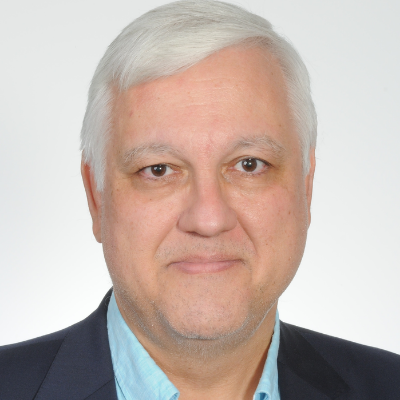
Carles Casacuberta
Carles Casacuberta is Chair of Geometry and Topology at the Universitat de Barcelona and internationally recognised for his research in homotopy theory, category theory, and their applications to algebra and geometry. He has published extensively on localisation and homological methods, forging important connections between categorical and topological approaches. Casacuberta is a member of the Institut d’Estudis Catalans and served as President of the Societat Catalana de Matemàtiques, reflecting his leadership in the Catalan scientific community. His work has strengthened algebraic topology in Spain, opened bridges towards applications in topological data analysis (TDA), and fostered collaborations with new research communities, both nationally and internationally.
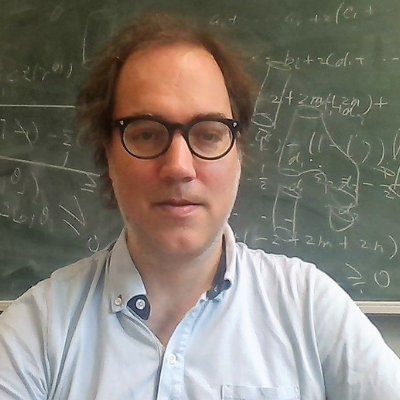
Urs Frauenfelder
Urs Frauenfelder is Professor of Mathematics at the University of Augsburg and internationally recognised for his work in symplectic and contact topology, Floer theory, and Hamiltonian dynamics. His contributions include fundamental advances in symplectic homology, leafwise intersections, and variational methods in geometry and dynamics. Frauenfelder has held academic positions in Switzerland and Korea, building strong bridges between European and Asian communities in symplectic geometry. He is widely regarded as a leading figure in Floer theory and its applications, shaping the field and fostering international collaborations in geometry and dynamical systems.

Eva Miranda
Eva Miranda is Chair of Geometry and Topology and ICREA Academia awardee at the Universitat Politècnica de Catalunya, and Gauss Professor at the Academy of Sciences of Göttingen. She is internationally recognised for her research at the intersection of symplectic and Poisson geometry, dynamical systems, celestial mechanics, and, more recently, computation. She has pioneered the study of singular symplectic and Poisson structures and uncovered undecidability phenomena in fluid dynamics. Miranda has received prestigious international distinctions such as the François Deruyts Prize, an FSMP Chaire d’Excellence, the 2023 Hardy Lectureship, and the Friedrich Wilhelm Bessel Research Award. Her influential work and leadership have shaped modern approaches to symplectic geometry and broadened its applications across mathematics and physics.
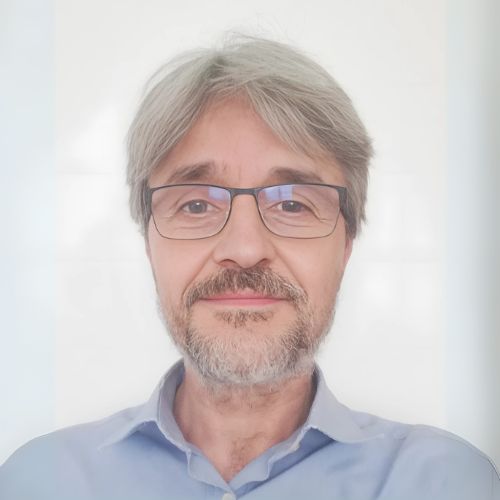
Ignasi Mundet i Riera
Ignasi Mundet i Riera is Professor of Geometry and Topology at the Universitat de Barcelona and member of CRM. He is internationally recognized for his research in gauge theory and moduli spaces. He has contributed important results on stability conditions, principal bundles, group actions and the Hitchin–Kobayashi correspondences.He is currently the Director of the Institut de Matemàtiques de la Universitat de Barcelona (IMUB), where he plays a leading role in promoting excellence and internationalisation in mathematics research. His leadership is positioning IMUB as a hub connecting mathematics with new scientific communities and fostering international collaborations.
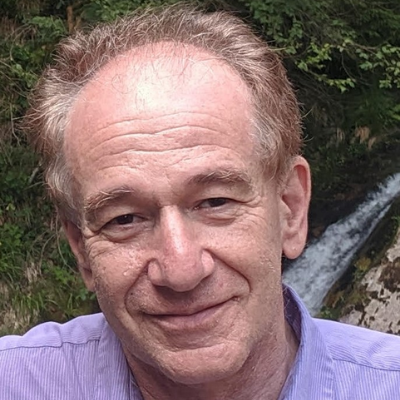
Leonid Polterovich
Leonid Polterovich is Chair of Mathematics at Tel Aviv University and internationally recognised for his research in symplectic topology, dynamical systems, and functional analysis. He has introduced influential notions such as symplectic quasi-states and Poisson bracket invariants, which have profoundly reshaped the field. Polterovich is the author of several landmark monographs, a member of the Academia Europaea, and a recipient of distinguished honours including the Erdős Prize and the EMS Prize. His scholarship and vision have built new bridges across mathematical disciplines and inspired a global community of researchers in geometry and dynamics.
SCHEDULE
| Mon, Jan 19| Venue: IMUB – Aula T1, Universitat de Barcelona (View on Google Maps) | |
| 10:00 – 11:30 |
Topological Data Analysis Lecturer: Carles Casacuberta |
| 11:30 – 12:00 | Coffee break |
| 12:00 – 13:30 |
Topological Data Analysis Lecturer: Carles Casacuberta |
| 15:30 – 17:00 |
Morse Theory Lecturer: Ignasi Mundet |
| Tue, Jan 20 | Venue: IMUB – Aula T1, Universitat de Barcelona (View on Google Maps) | |
| 10:00 – 11:30 |
Morse Theory Lecturer: Ignasi Mundet |
| 11:30 – 12:00 | Coffee break |
| 12:00 – 13:30 |
Introduction to Symplectic Geometry Lecturer: Eva Miranda |
| 15:30 – 17:00 |
Introduction to Symplectic Geometry Lecturer: Eva Miranda |
| 17:00 – 17:30 | Joint Discussion Session |
| Wed, Jan 21| Venue: Sala de Graus, EPSEB – SYMCREA, Universitat Politècnica de Catalunya (View on Google Maps) | |
| 10:00 – 11:00 |
Floer Homology Lecturer: Urs Frauenfelder |
| 11:00 – 11:20 | Coffee break |
| 11:20 – 12:20 |
Floer Homology Lecturer: Urs Frauenfelder |
| 12:30 – 13:30 |
Persistence Modules in Symplectic Topology Lecturer: Leonid Polterovich |
| 15:30 – 16:30 |
Persistence Modules in Symplectic Topology Lecturer: Leonid Polterovich |
| Thu, Jan 22 | Sala de Graus, EPSEB – SYMCREA, Universitat Politècnica de Catalunya (View on Google Maps) | |
| 10:00 – 11:00 |
Floer Homology Lecturer: Urs Frauenfelder |
| 11:00 – 11:20 | Coffee break |
| 11:20 – 12:20 |
Floer Homology Lecturer: Urs Frauenfelder |
| 12:30 – 13:30 |
Persistence Modules in Symplectic Topology Lecturer: Leonid Polterovich |
| 15:30 – 16:30 |
Persistence Modules in Symplectic Topology Lecturer: Leonid Polterovich |
| Fri, Jan 23 | Sala de Graus, EPSEB – SYMCREA, Universitat Politècnica de Catalunya (View on Google Maps) | |
| 10:00 – 11:00 |
Floer Homology Lecturer: Urs Frauenfelder |
| 11:00 – 11:20 | Coffee break |
| 11:20 – 12:20 |
Floer Homology Lecturer: Urs Frauenfelder |
| 12:30 – 13:30 |
Persistence Modules in Symplectic Topology Lecturer: Leonid Polterovich |
| 13:30 – 15:30 | Special Closing Lunch at SYMCREA (open to all participants) |
| 15:30 – 16:30 |
Persistence Modules in Symplectic Topology Lecturer: Leonid Polterovich |
| 16:30 – 17:30 | Final Joint Discussion Session – Closing |
Course Vision
This course is designed not as a comprehensive overview, but as a launchpad for further research, equipping participants with critical tools and insights into a vibrant intersection of geometry, topology, and data analysis.
BIBLIOGRAPHY
- Audin, M., and Damian, M. (2014). Morse Theory and Floer Homology. Universitext. Springer, London.
- Chazal, F., de Silva, V., Glisse, M., and Oudot, S. (2016). The Structure and Stability of Persistence Modules. Springer Briefs in Mathematics. Springer, Cham.
- Floer, A. (1988). Morse theory for Lagrangian intersections. Journal of Differential Geometry, 28(3), 513–547.
- McDuff, D., and Salamon, D. (1998). Introduction to Symplectic Topology. Oxford Graduate Texts in Mathematics, vol. 27. Oxford University Press, Oxford.
- Oudot, S. (2015). Persistence Theory: From Quiver Representations to Data Analysis. Mathematical Surveys and Monographs, vol. 209. American Mathematical Society, Providence, RI.
- Polterovich, L., Rosen, D., Samvelyan, K., and Zhang, J. (2020). Topological Persistence in Geometry and Analysis. University Lecture Series, vol. 74. American Mathematical Society, Providence, RI.
- Salamon, D. (1999). Lectures on Floer homology. In: Symplectic Geometry and Topology (Park City, UT, 1997). IAS/Park City Mathematics Series, vol. 7. American Mathematical Society, Providence, RI, pp. 143–229.
LIST OF PARTICIPANTS
| Name | Institution |
|---|---|
| Martí Parés Baraldés | |
| Giorgi Khimshiashvili | Ilia State University, Tbilisi, Georgia |
| Abella El Kabouss | FEGG, Ibn Zohr univerisity |
| Ferran Dachs Cadefau | Universitat d'Andorra |
| Alfred Alcon Beltran | Universitat d'Andorra |
| Joan Gimeno | Other |
| Luciana Garbayo Sarmento | Fiocruz |
| Zamurat Ayobami Adegboye | Federal University of Health Sciences (FUHSO) Otukpo |
| Cleofe peña gómez | Institut d’Investigació i Innovació Parc Taulí (I3PT-CERCA) - UAB |
| Amir Niknejad | UMSV |
| Marta Mariscal | Universitat de Barcelona |
| Robert Cardona | Universitat de Barcelona |
| Donato Fuejo Martin | Universitat de Barcelona |
| Ignasi Mundet Riera | Universitat de Barcelona |
| Marc López Vilamajó | Universitat de Barcelona |
| Andrea Isabel Vicente Sastre | Universitat de Barcelona |
| Yuanxi He | Universitat de Barcelona |
| Carles Casacuberta Vergés | Universitat de Barcelona |
| Varg Brangwin Martín | Universitat de Barcelona |
| Jordi Garriga Puig | Universitat de Barcelona |
| Joana Cirici Nuñez | Universitat de Barcelona |
| David Martínez Carpena | Universitat de Barcelona |
| Roger Bergadà Batlles | Universitat Autònoma de Barcelona |
| Marc Miranda Riaza | Universitat Autònoma de Barcelona |
| Dolors Herbera Espinal | Universitat Autònoma de Barcelona |
| Alejandro García | Universitat Autònoma de Barcelona |
| Elena Isasi Theus | Universitat Politècnica de Catalunya |
| Josep Sans | Universitat Politècnica de Catalunya |
| Pedro Lopez Sancha | Universitat Politècnica de Catalunya |
| Eva Miranda Galcerán | Universitat Politècnica de Catalunya |
| Kamil Przybyszewski | Universitat Politècnica de Catalunya |
| Guillermo Matthews Martínez | Universitat Politècnica de Catalunya |
| Àlex Garcia Herranz | Universitat Politècnica de Catalunya |
| Jeremy Gunawardena | Universitat Pompeu Fabra |
| Jesus Brezmes-Llecha | Universitat Rovira i Virgili |
| Arnau Metaute | Universitat Ramon Llull |
| Marco Delgado-Garrido | Universidad de Sevilla |
| Manuel de la Rosa Fernández | Universidad Nacional de Educación a Distancia |
| Judit Jansat Ballarín | University of Montpellier |
| Shahnaz Shamim Shahul | Paul Sabatier University - Toulouse III |
| Santiago Galella | Goethe University Frankfurt |
| Daniel Kreisberger | University of Augsburg |
| Mauritz Wiechmann | University of Augsburg |
| Emilia Konrad | University of Augsburg |
| Kevin Manogue | University of Padua |
| Jeonghyeon Kim | Sogang University |
| Hyungki Lee | Sogang University |
| Federico Poncio | Centre de Recerca Matemàtica |
| Søren István Adorján Dyhr | Centre de Recerca Matemàtica |
| Pablo Nicolás | Centre de Recerca Matemàtica |
acknowledgements
This course is organised with the support of several research initiatives: the project PID2023-146936NB-I00 funded by the Agencia Estatal de Investigación (AEI); the bilateral AEI-DFG project AQUACELL: Celestial Mechanics, Hydrodynamics, and Turing Machines; the ICREA Academia programme; and the AGRUPS2025 project of the Universitat Politècnica de Catalunya (UPC).



|
For inquiries about this event please contact the Scientific Events Coordinator Ms. Núria Hernández at nhernandez@crm.cat
|
CRM Events code of conduct
All activities organized by the CRM are required to comply with the following Code of Conduct.
CRM Code of Conduct
scam warning
We are aware of a number of current scams targeting participants at CRM activities concerning registration or accommodation bookings. If you are approached by a third party (eg travellerpoint.org, Conference Committee, Global Travel Experts or Royal Visit) asking for booking or payment details, please ignore them.
Please remember:
i) CRM never uses third parties to do our administration for events: messages will come directly from CRM staff
ii) CRM will never ask participants for credit card or bank details
iii) If you have any doubt about an email you receive please get in touch


